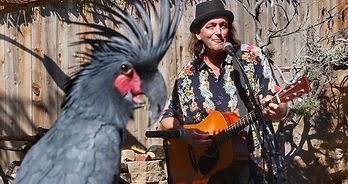A little about us...


“A bird is three things: feathers, flight, and song.”
—Marjorie Allen Seiffert
When birds come to SBBS, they join our flock through planned relinquishment or as a displaced companion, no longer able to stay in the home they are accustomed to. First things first, each bird's needs are assessed and a program for proper care implemented. Rehabilitation considers both the condition of a bird's physical needs and its behavioral needs. In some cases, a well-loved bird who has outlived its human companion may only need an adjustment period before a new loving home can be found and the perfect match made. However, in many other cases, the reality is that a bird needs extensive veterinary care to restore health and behavior modification to restore happiness and sociability.

“And maybe...you are a little fat bear cub with no wings and no feathers.” —Else Holmelund Minarik
Left too much by themselves, lacking attention and being bored, birds will turn on themselves as a means of expressing their unhappiness. They will pluck out their feathers, obsessing on one particular part of their body or picking themselves bald wherever they can reach. In extreme situations, they are capable of mutilating themselves to such an extent that they must be outfitted in protective vests or collars to stop the self-destructive behavior. Examined by an avian veterinary specialist and observed by the Sanctuary director, an SBBS bird will receive the necessary treatment to return a parrot to as much of its former feathered glory as possible.




“So vehement and intense is his life, large-brained, large-lunged, hot, ecstatic...” —John Burroughs
Fixated on one person in a family as their love object, birds may act out aggressively toward other family members. Upon maturity and the flow of hormones, their behavior can drastically change. Biting, screaming, and destructive behavior can be common occurrences. Large parrots like macaws and cockatoos, are equipped with beaks designed to have the blunt force equal to the jaw strength of a large dog, equivalent to 500 to 700 pounds per square inch. They easily crack hard shelled nuts, therefore their bite can pack quite a punch!
At the same time, parrot species are extremely social; they need interaction and attention to a degree that surprises most people. It is just their nature that they can become jealous and possessive. And again, in frustration, they may turn on themselves often feather picking or engaging in self-mutilation. At SBBS, birds receive a ton of attention, as much to making their environment stimulating as to making them feel loved and appreciated.



“Eat like a bird”
Whoever thought that birds have little appetite never understood birds at all. In the wild, they are free to fly and find delicious delights whenever the mood strikes. Caged, most birds are consigned to little plastic containers of generic seed. A diet of 100% seed causes all sorts of physical ailments that express themselves from the condition of feathers to the strength and stability of claws to fatty tumors that weigh down their bodies. Birds joining the Sanctuary flock have also been diagnosed with heart and liver diseases, along with high cholesterol and arteriosclerosis. To help restore health, the parrot species at SBBS eat specially designed, environment-appropriate foods that are similar to what they would find in their native lands. The foods from nuts and grain to fruits and vegetables suit their beaks as well as their tummies. As a result, health, spirit, and strength come flooding back to birds who never had the opportunity to eat from the right menu!







